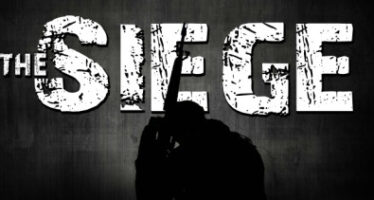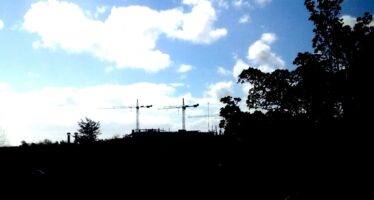‘Why are we here?’ ask jailed Turkish journalists
![]()
Friday, May 6, 2011 Göksel BOZKURT / First Person S?L?VR? – Hürriyet Daily News

This file photo shows supporters of jailed Turkish journalists staging a protest against their detention.
After a pat-down, we handed over everything except the clothes on our backs and were subjected to a metal-detector test, an ID check and a retina scan before we were let inside. It was my first visit to a prison.
The artwork by inmates that hung on the cold walls was not enough to disperse the gloomy, unsettling environment inside Silivri prison.
I had come to the Istanbul facility with a group of journalists, all members of the Freedom for Journalists Platform, the day after the world celebrated World Press Freedom Day on May 3. We were there to see just how grim the picture was for some of the 67 jailed journalists in Turkey.
We were taken to the visitors’ room, where we waited for the first jailed journalist to be brought in for our meeting. I looked out of the narrow window while we waited; it was nearly impossible to see the sky through the bars.
Daily Cumhuriyet’s former Ankara representative Mustafa Balbay, arrested as part of the Ergenekon coup-plot case, was brought in first. He ran up to us and shook our hands, eager to talk about many issues in the limited 20 minutes given for the meeting. The ongoing investigation, along with the Balyoz (Sledgehammer) coup case, has seen some two dozen journalists jailed.
Balbay said he still does not know what his crime is and complained about his isolated single-person cell, just 7 square meters in size. He told us about the three crows he befriended in the prison yard. Surely, being incarcerated for so long – nearly 800 days – must have changed him, but his sense of humor was still intact.
He laughed while telling us that he had transformed 1 square meter of his cell into an office, “where I carry out my political work,” referring to his deputy candidacy for the main opposition Republican People’s Party, or CHP. The upcoming elections give him hope of finally leaving prison, but Balbay said he is also serious about being an assertive politician.
Kanaltürk founder Tuncay Özkan was brought in next. Though he had clearly been paying attention to his appearance and had an athletic look about him, the worry lines were obvious on his face. Özkan also complained about the physical limitations of his single-person cell. With much of his cell monitored by security cameras, Özkan said he had difficulty showering comfortably. Dampness is also an issue. “I witnessed here that moss blooms and flowers,” he said.
“If only I knew what my crime was, I would serve my time for as long as they want,” Özkan said. “But this case is political; it is illegal.” The handcuffs around his wrists made him resent going to court. It was obvious the 32 months he has spent behind bars had left deep scars.
Investigative reporter Nedim ?ener, a columnist for Posta, shares a cell with fellow reporter Ahmet ??k. They both say they too have no idea what their crimes are. “They tell us to prove our innocence, but they can’t prove we are guilty,” ??k said with a burst of energy. He said he is bothered by the hum echoing through the empty halls and usually tries to sleep during the day. Indeed, the background noise was so headache-inducing and loud that conversation was difficult.
OdaTV owner Soner Yalç?n was brought into the meeting next. “I spent my career trying to uncover structures such as Ergenekon,” Yalç?n said. “I told the prosecutor that we could work together to bring this to light. But now I see that through their mentality, they will not be able to sentence anyone.”
OdaTV writer Müyesser Y?ld?z was also excited to meet her colleagues. She eagerly told us that she wrote for the online news portal only three times, and did not know Yalç?n. “I don’t even know what my crime is,” she said, adding that from now on she would use a typewriter instead of a computer to avoid false accusations. Y?ld?z shares a cell with three other women, in a prison meant for men. She also told us how much she misses her son.
Mehmet Haberal, the founder of Ba?kent Hospital in Ankara and owner of Kanal B, echoed the same sentiments as the others, questioning why he was behind bars. “I was put on trial for signing a petition after the Sept. 12 [1980] coup. How can I be pro-coup when I was asked to run for president in 2000 by Bülent Ecevit?” he asked. (Former President Ecevit, of course, had been ousted by the military coup.)
Professor Yalç?n Küçük seemed cheery and dynamic as he entered the meeting room. His voice had a lighthearted tone as he told us he was an experienced inmate. “Don’t ask me about prison conditions. I have been under arrested the longest in the country after [Workers’ Party leader] Do?u Perçinek,” the writer said.
In total, we met with 15 journalists behind bars. All are from different political backgrounds, but all ask the same question: “What is our crime? Why are we here?”
Related Articles
US Tour of Palestinian Play ‘The Siege’ Cancelled
![]()
The Jenin Freedom Theatre announced that it will no longer bring The Siege to the US this May
Un documental da protagonismo a las víctimas del fascismo
![]()
«Ojos que no ven. Víctimas del fascismo desde la transición» es el título de un documental presentado ayer en Bilbo
The Steel Cranes
![]()
The people of Ireland, since 30 September 2008, have been taught a harsh lesson in the nature of class power and the Irish State




